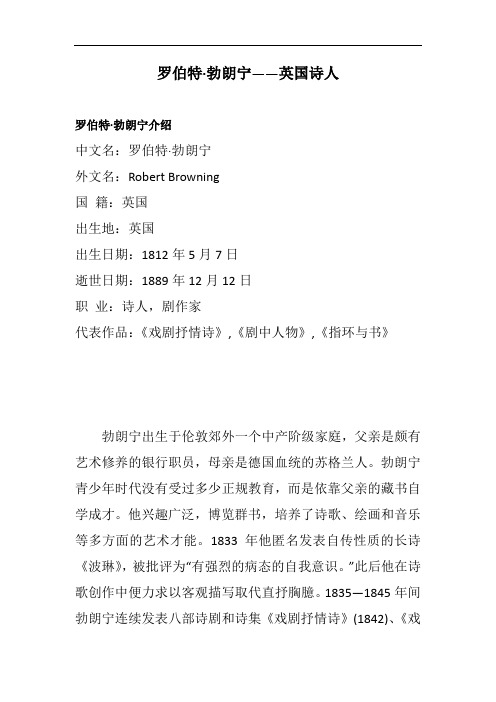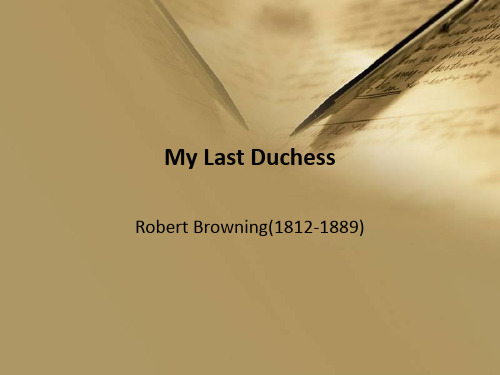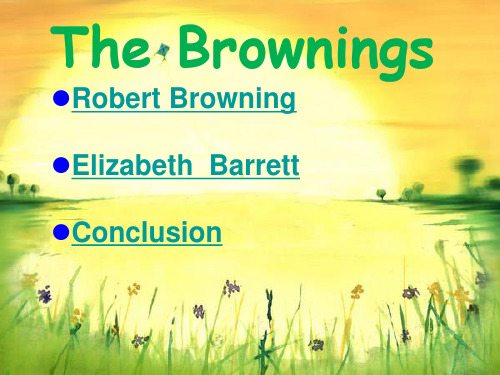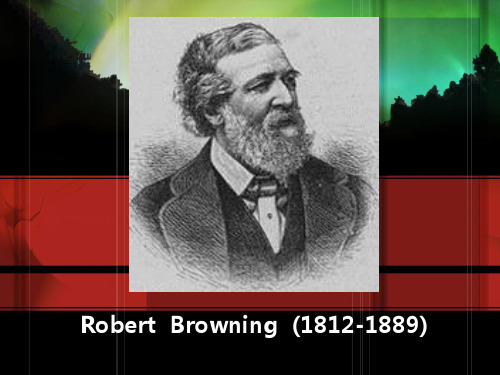罗伯特·勃朗宁(Robert_Browning)
大树下的童年-勃朗宁夫妇

Some of his works
• Bells and Pomegranates Series( No. I:~No.VIII) • Men and Women(1855) 《男男女女》 • Dramatis Personae(1864) 《剧中人物》 • The Ring and the Book(1868-9) 《指环与书》 • Dramatic Idylls: Second Series(1880) • Jocoseria(1883) • Ferishtah's Fancies(1884) • Parleyings with Certain People of Importance In Their Day(1887) • Asolando(1889)
Personal Information
• In Florence he worked on the poems that eventually comprised his two-volume Men and Women, in 1855, however, they made little impact. It was only after his wife's death, in 1861, when he returned to England and became part of the London literary scene, that his reputation started to take off. In 1868, after five years work, he completed and published the long blank-verse poem The Ring and the Book, and finally achieved a really significant hit.
罗伯特·勃朗宁——英国诗人

罗伯特·勃朗宁——英国诗人
罗伯特·勃朗宁介绍
中文名:罗伯特·勃朗宁
外文名:Robert Browning
国籍:英国
出生地:英国
出生日期:1812年5月7日
逝世日期:1889年12月12日
职业:诗人,剧作家
代表作品:《戏剧抒情诗》,《剧中人物》,《指环与书》
勃朗宁出生于伦敦郊外一个中产阶级家庭,父亲是颇有艺术修养的银行职员,母亲是德国血统的苏格兰人。
勃朗宁青少年时代没有受过多少正规教育,而是依靠父亲的藏书自学成才。
他兴趣广泛,博览群书,培养了诗歌、绘画和音乐等多方面的艺术才能。
1833年他匿名发表自传性质的长诗《波琳》,被批评为“有强烈的病态的自我意识。
”此后他在诗歌创作中便力求以客观描写取代直抒胸臆。
1835—1845年间勃朗宁连续发表八部诗剧和诗集《戏剧抒情诗》(1842)、《戏
剧浪漫诗及抒情诗》(1845)。
在后两部诗集中,诗人创造了别具一格的、以心理分析为主旨的戏剧独白诗。
1845年,勃朗宁和著名诗人伊丽莎白·巴莱特相识,构成了英国文学史上最饶趣味的恋爱佳话。
第二年他们秘密结婚,迁居意大利,直到1860年伊丽莎白去世,勃朗宁才返回英国。
罗伯特勃朗宁 Robert Browning My Last Duchess

• 3. The form parallels the novelistic experiment with the point of view in which the reader is privileged to make an assessment of the intelligence and credence of the speaker.
• 4. The auditor's presence and response are merely inferred from the clues of the speech of the single speaker.
Six parts:
• • • • • •
speaker listener scene interaction between the listener and speaker an exposure of the characters' personality the present actions
Marriage
• Elizabeth Barrett Browning(1806-1861) • born in 1806 in a rich family. • At age 15, she injured her spine in a riding accident and became a helpless invalid confined to her own room.
Feminism in his works
• In Victorian Age, the queen was in power, but woman's rights were low. Women from upper class were only regarded as a kind of ornaments. • We can find many Browning's works have women characters. For example, in My Last Duchess, we can see Browning's sympathy for the women and his effort to speak for the women. • Although he could not get rid of the limitations of that time, we can find he had noticed the value of woman in artistic creation.
my last duchess格律-概述说明以及解释

my last duchess格律-概述说明以及解释1.引言1.1 概述概述部分的内容应该对整篇文章进行简要的介绍和概括,让读者对文章的主题和要点有一个初步的了解。
针对"my last duchess"这个主题,可以在概述部分引入以下内容:概述部分:"my last duchess"是一首由罗伯特·勃朗宁(Robert Browning)创作的著名诗歌,属于威尼斯重心派(Victorian Era)时期的文学作品。
本文将深入探讨这篇诗歌的格律以及其中所描绘的故事情节。
本文章的结构将分为引言、正文和结论三个部分。
在引言部分,我们将提供一个概述,通过对整篇文章的框架和目的的说明,让读者了解本文的主要内容和目标。
接下来,文章将在背景介绍部分(2.1)对《my last duchess》的创作背景和时代背景进行简要介绍。
在分析主题部分(2.2),我们将深入探讨这首诗所表达的主题,包括权力与控制、男性至上、婚姻关系中的失衡等。
最后,在结论部分,我们将对文章进行总结,概括出重点论述,并对诗歌主题进行深入的理解和思考。
通过这篇文章,我们将通过对"my last duchess"这首诗的格律分析,揭示其中所隐含的深意,并对这个时代的社会背景和文学风格进行一定的解读。
通过深入剖析,我们希望能够进一步理解这首诗背后的情感和诗人的创作意图。
1.2文章结构1.2 文章结构本文主要分为引言、正文和结论三个部分。
每个部分的内容如下:1. 引言部分:在引言部分,将对文章进行概述,给读者提供背景信息,并明确文章的目的。
1.1 概述:首先,简要介绍"My Last Duchess"这篇诗歌的作者罗伯特·勃朗宁,以及他的创作背景和时代背景。
"My Last Duchess"是一首被广泛研究和赞赏的短诗,它以第一人称的方式讲述了一位贵族男性对他去世的前妻的回忆和观察。
罗伯特.勃朗宁经典爱情诗歌两首

罗伯特.勃朗宁经典爱情诗歌两首
罗伯特·勃朗宁 Robert Browning,英国维多利亚时代唯一可与丁尼生媲美的诗人。
勃朗宁的小诗《夜会》中没有热烈而缠绵的描述,而是用他最擅长的戏剧性描写手法,将小伙子盼望见到爱人的急切心情宣泄得淋漓尽致。
看,小伙子在漆黑的夜晚,驾着小船驶过海湾,越过海滩,穿过田野,终于来到了爱人的身边,直到“两颗跳动的心紧紧相融”。
当太阳为他铺开一条金色大道,他没有留恋甜蜜的爱情,而是想到了自己的职责和任务,一个刚毅的男子汉展现在我们的面前。
由此,《夜会》和《晨别》作为一个整体,给我们全面勾勒了勃朗宁的爱情观。
Robert_Browning_罗伯特·勃朗宁

Works
My Last Duchess
That's my last Duchess painted on the wall, Looking as if she were alive. I call That piece a wonder, now: FràPandolf's hands Worked busily a day, and there she stands. Will 't please you sit and look at her? I said 'FràPandolf' by design, for never read Strangers like you that pictured countenance, The depth and passion of its earnest glance, But to myself they turned (since none puts by The curtain I have drawn for you, but I) And seemed as they would ask me, if they durst, How such a glance came there; so, not the first
In ge ne ra l, B row ning's poe m s a re not m e a nt to e nte rta in the re a de rs w ith the usua l a coustic a nd visua l ple a sure s: the y a re suppose d to ke e p the m a le rt, thoughtful a nd e nlighte ne d.
meeting at night

Meeting at Night By Robert Browning The grey sea and the long black land; And the yellow half-moon large and low; And the startled little waves that leap In fiery ringlets from their sleep, As I gain the cove with pushing prow, And quench its speed i' the slushy sand. Then a mile of warm sea-scented beach; Three fields to cross till a farm appears; A tap at the pane, the quick sharp scratch And blue spurt of a lighted match, And a voice less loud, through its joys and fears, Than the two hearts beating each to each!
knock window glass scrape A tap at the pane, the quick sharp scratch
轻扣窗户;急速的哧啦声响,
spray And blue spurt of a lighted match,
蓝光闪过,火柴点亮。
Meeting at Night
And a voice less loud , through joys and fears,
Robert Browning (1812-1889)
Robert Browning
Robert Browning 罗伯特 勃朗宁简介

In 1833, Browning anonymously published his first major published work, Pauline, and in 1840 he published Sordello, which was widely regarded as a failure. He also tried his hand at drama, but his plays, including Strafford, which ran for five nights in 1837, and the Bells and Pomegranates series, were for the most part unsuccessful. Nevertheless, the techniques he developed through his dramatic monologues—especially his use of diction, rhythm, and symbol—are regarded as his most important contribution to poetry, influencing such major poets of the twentieth century as Ezra Pound, T. S. Eliot, and Robert Frost.
A Selected Bibliography
• Poetry • Pauline (1833) • The Ring and the Book (10 verse narratives, 1868) • My Last Duchess (a dramatic monologue that explores the idea of possessive/distorted love) (1842) • Porphyria‘s Lover (a poem of love lust, and murder) (1836-42) • Home-Thoughts, from Abroad (1845) • Bells and Pomeganates (a series of his works,184146)
- 1、下载文档前请自行甄别文档内容的完整性,平台不提供额外的编辑、内容补充、找答案等附加服务。
- 2、"仅部分预览"的文档,不可在线预览部分如存在完整性等问题,可反馈申请退款(可完整预览的文档不适用该条件!)。
- 3、如文档侵犯您的权益,请联系客服反馈,我们会尽快为您处理(人工客服工作时间:9:00-18:30)。
Middle Life
• He even wrote several stage plays (between 1836 and 1843) which were also well-received, though quite forgotten today. • Between 1841 and 1846, he published four books, mainly collections of his shorter poems that would become among his most famous works. • It was about this time that Robert's correspondence with Elizabeth Barrett began, when he wrote to thank her for a flattering mention of his work in one of her poems.
Browning’s Wife
• Born at Coxhoe Hall, grew up in the west of England • A most respected and successful woman poet of the Victorian period, and was largely educated at home by a tutor, quickly learning French, Latin and Greek. • She was considered to deserve the laureateship, but which eventually was awarded to Tennyson in 1850. Her greatest work, SONNETS FROM THE PORTUGUESE (1850), is a sequence of love sonnets addressing to her husband. • Her vivid intelligence and ethereal physical appearance made a lifelong impression to Ruskin, Carlyle, Thackeray, Rossetti, Hawthorne, and many others.
Work List
• • • • Pauline: A Fragment of a Confession (1833) Paracelsus (1835) Sordello(1840) Bells and Pomegranates No. III: Dramatic Lyrics (1842) – My Last Duchess – The Pied Piper of Hamelin Dramatic Romances (1845) Men and Women (1855) The Ring and the Book (1868-1869) The Inn Album (1875) Solando (1889)
Elizabeth Barrett (1806-1861)
Late Life
• It was only after his wife's death, in 1861, when he returned to England and became part of the London literary circle, that his reputation started to take off. • In 1868, he completed and published the long blank-verse poem The Ring and the Book, and finally achieved really significant recognition. • Wrote a great deal right up to the end of his life, though he was plagued by colds and bronchitis; his last book, Asolando, was published the day of his death, December 12, 1889. • Assumed he would be buried beside Elizabeth, but for the cemetery had been closed to further burials, he instead received a grand funeral at Westminster Abbey.
• • • • •
My Last Duchess
The picture is kept hidden
behind a curtain
Where the Duke can enjoy it by himself
When the Duke draws back the curtain the envoy sees in the Duchess’expression:
§ When
talking about Robert Browning, we have to mention his wife, Elizabeth Barrett Browning.
§ She
was a famous poet, too. She wrote many sonnets, a type of 14 line poem, the same as Shakespeare did.
Middle Life
• In this very first letter, he told her that he loved her, which alarmed Elizabeth immensely. Still, he managed to meet her face to face in May of 1845 and marry her in September of that year. • The happy couple went to Florence and were enchanted by it, finally settling in the famous Casa Guidi. • The years in Florence were among the happiest for both of them. Her love for him was demonstrated in the Sonnets from the Portuguese, and to her he dedicated Men and Women, which contains his best poetry.
The Camberwell Palace (1900)
Early Life
• At 16, Robert began attending the newly-formed London University, established for those Nonconformists like Robert who were barred from Oxford and Cambridge. • Robert attended for only just over a year, though thanks to his reading, he was really quite an educated man. He also was quite arrogant at times. • His family had enough money to support him in these poetical endeavors . His first published work, Pauline, was considered not very good, but promising; His second, Paracelsus, was well-received and Robert was always proud of it.
Early Life
• Born on May 7,1812, in Camberwell (a suburb of London), first child and only son of Robert Browning and Sarah Wiedemann Browning. • Robert was an impulsive, fearless little boy who was also rather a prodigy, writing poems and reading Homer at a very young age. His father encouraged him to read and he had access to his large (6,000 vols) library. In his teens, Browning discovered Shelley, adopting the author's confessionalism in poetry. • He learned many languages and devoured his father's history books. He also liked to read books that were considered rather shocking and not quite suitable for children.
§ Elizabeth
and her husband Robert had a great love affair, almost like a movie. Browning was six years younger than his wife. They ran away to Italy to get married.
